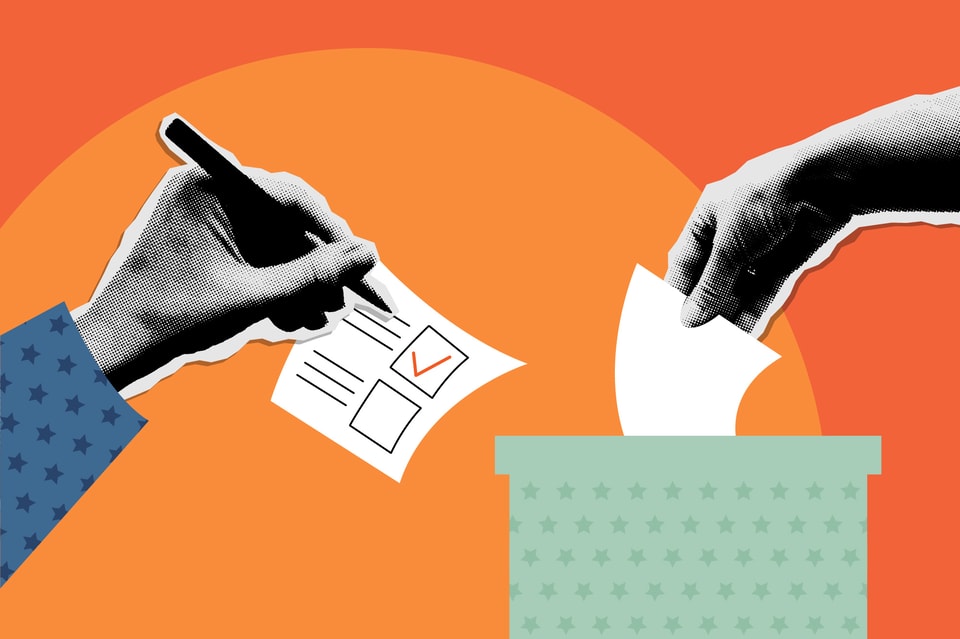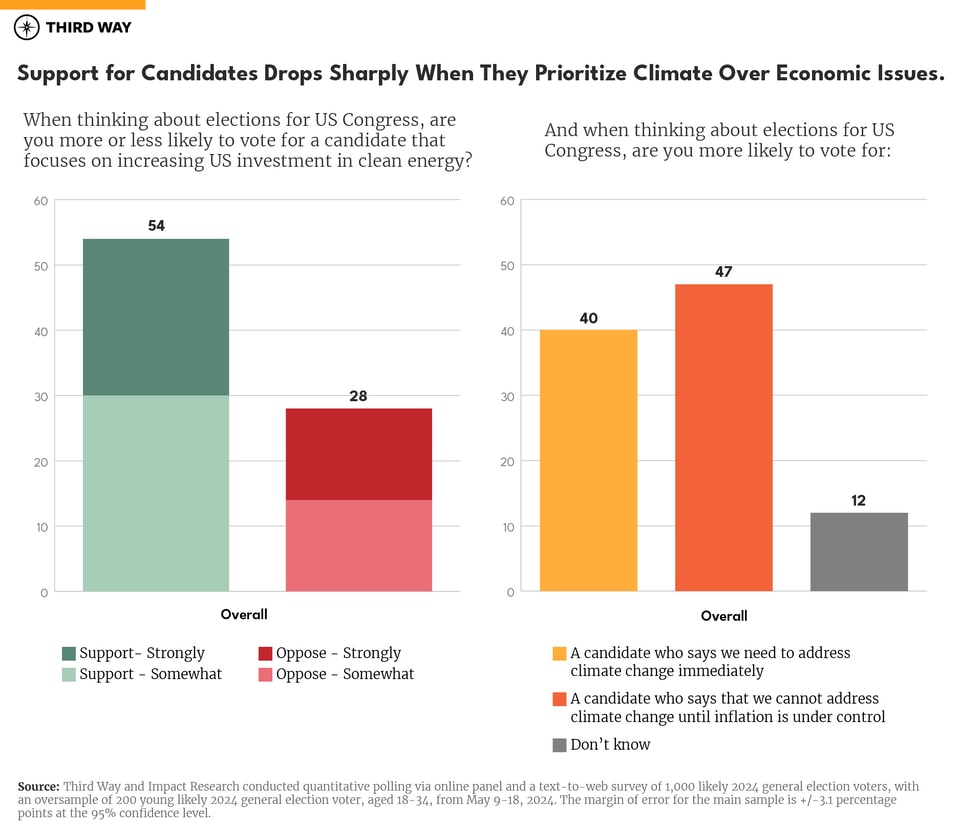Memo Published June 17, 2024 · 6 minute read
Luxury or Necessity? Digging into Clean Energy and Climate Messaging in the 2024 Election
Mary Sagatelova & Emily Becker

Democrats often emphasize the emissions-reducing and climate benefits of clean energy because they believe a large number of voters from critical demographics—including young people and people of color—are deeply concerned about climate change. In two separate surveys, however, Third Way’s polling shows that just a small slice of the electorate is motivated by this kind of climate-oriented, environmentalist message. Instead, the plurality of American voters are more compelled by messaging that underscores clean energy’s contributions to America’s economy.
Our first poll in January 2024 showed that messages on clean energy and energy independence, good-paying clean energy jobs, and cleaner air and water were, on average, two times as effective with voters than messaging on environmental protection and carbon emissions. Messages highlighting economic factors performed particularly well with essential constituencies, including non-college voters, women, young people, and Latinos.
This piece outlines topline findings from our second poll, conducted in May 2024. In partnership with Impact Research, we sought to deepen our understanding of Americans’ priorities this election cycle and what made these messages effective.
Major Takeaways
Democrats and clean energy advocates often claim that a major voting bloc—composed mostly of young people and people of color—is prioritizing climate change this election. Our research tells a different story: Young people and people of color are actually far more likely to rank lowering costs and reducing inflation as their top issue. We call these voters “Economy-First”.
By contrast, Climate-First Voters—those who list fighting climate change and protecting the environment first—tend to hold a college degree or higher and are slightly more likely to be white. They are also far more likely than Economy-First voters to be financially comfortable and to believe the economy is in good shape, by a margin of 35 and 47 points, respectively.
Crucially, Economy-First voters are a diverse group representing the plurality of voters in America. Climate-First voters are far smaller—just 4% of likely voters per our May 2024 poll—and more homogenous than Democrats and clean energy advocates would believe.
In this election, costs are top of mind for Americans.
When asked about their priorities in this election, voters were significantly more likely to list inflation and high costs as their top concern by a 29-point margin, than fighting climate change, with just 4% of voters ranking climate change as a top priority.
Though 72% of respondents said they supported investing in clean energy in the abstract, that support decreased when respondents were asked to put climate action in the context of current economic issues.
Voters want to hear how candidates will address high costs this election, not climate change.
Americans, including those who supported clean energy writ large, were less likely to support candidates who focused on clean energy over economic issues. Just over 50% of respondents say they’d back a candidate who views investment in clean energy as a priority issue. That support drops 14 points when asked to choose between a candidate who wants immediate climate action and one who feels we must address inflation before combating climate change. A plurality of respondents chose the Economy-First candidate.

Talking about climate is a luxury. Talking about costs is a necessity.
We tested different arguments for clean energy investment and found that the most effective messages emphasized clean energy as a tool to meet Americans’ other priorities: energy independence, stable and low-cost energy, high-paying jobs that don’t require a college degree, and improved public health outcomes and lower health care costs due to cleaner air and water. When asked why they found these messages effective, respondents, especially young ones, cited the potential to keep costs down and drive salaries up.
Messaging on the role of clean energy technologies in creating good-quality, high-paying jobs for Americans significantly outperformed messaging focusing on the environmental benefits of clean energy, especially among the 52% of respondents who reported concerns that they wouldn’t make enough money to meet their basic needs. For these individuals, the promise of good-paying jobs through clean energy investment was particularly meaningful and a stronger reason to support clean energy than climate benefits.
Cost concerns also drove voter support for energy independence messaging, which emphasized clean energy as a path to greater energy independence for the US. Nearly a quarter of respondents said they liked the message because energy independence helps keep energy costs down and therefore clean energy investments could do the same. Similarly, our message on public health, which noted that clean energy can reduce expensive health problems related to air and water pollution, also performed well, with 58% of respondents in support. Over 10% of these respondents noted that healthcare costs were the primary motivator of their support for clean energy investments.
It’s simple: if you’re prioritizing climate change this election, you’re financially comfortable. For everyone else, it remains a fringe issue, and cost-of-living concerns take center stage.
Democrats win when they lead the conversation on clean energy, costs, and job creation.
Our economics-focused messages on clean energy performed extremely well against Republican counter-arguments, which framed clean energy as a costly, politicized distraction from efforts to make the US more energy-independent and lower household costs. Our messages beat these counter-arguments by between 11 and 17 points.
When we start the debate, rather than simply responding to Republican messaging, we have an even stronger advantage. In a back-and-forth that begins with Democrats’ message on energy independence, we outperform Republican counterarguments by 17 points. It pays to be aggressive: Democrats must start the conversation on clean energy and center their message on low costs, greater opportunity, and increased energy independence.
Bottom Line
Our findings challenge the notion that clean energy and climate can drive meaningful support for candidates in the 2024 election. This is not the news we, as a Climate & Energy Program, wanted to deliver, but it is the political reality we are operating in and must react to.
In a head-to-head race, Trump is leading by 1 point among the general populace and by a 26-point margin among the Economy-First voters we need to reach. Meanwhile, Climate-First voters are solidly in Biden’s camp by a 96-point margin. Biden is in jeopardy, and it’s clear that the conventional climate message isn’t helping win the voters we need for this election.
While many groups cite abstract support for climate action as evidence that candidates should lean into climate messaging, our research shows that respondents are far more focused on lowering costs, raising salaries, and getting a grip on inflation. That’s especially true for young voters, who are exceptionally concerned about high prices. In this election, effective clean energy messaging is about costs, not climate.
Methodology
From May 9-18, 2024, Third Way and Impact Research conducted quantitative polling via online panel and a text-to-web survey of 1,000 likely 2024 general election voters, with an oversample of 200 young likely 2024 general election voters, aged 18-34. The margin of error for the main sample is +/-3.1 percentage points at the 95% confidence level. The margin of error for the subgroup varies and is higher.

